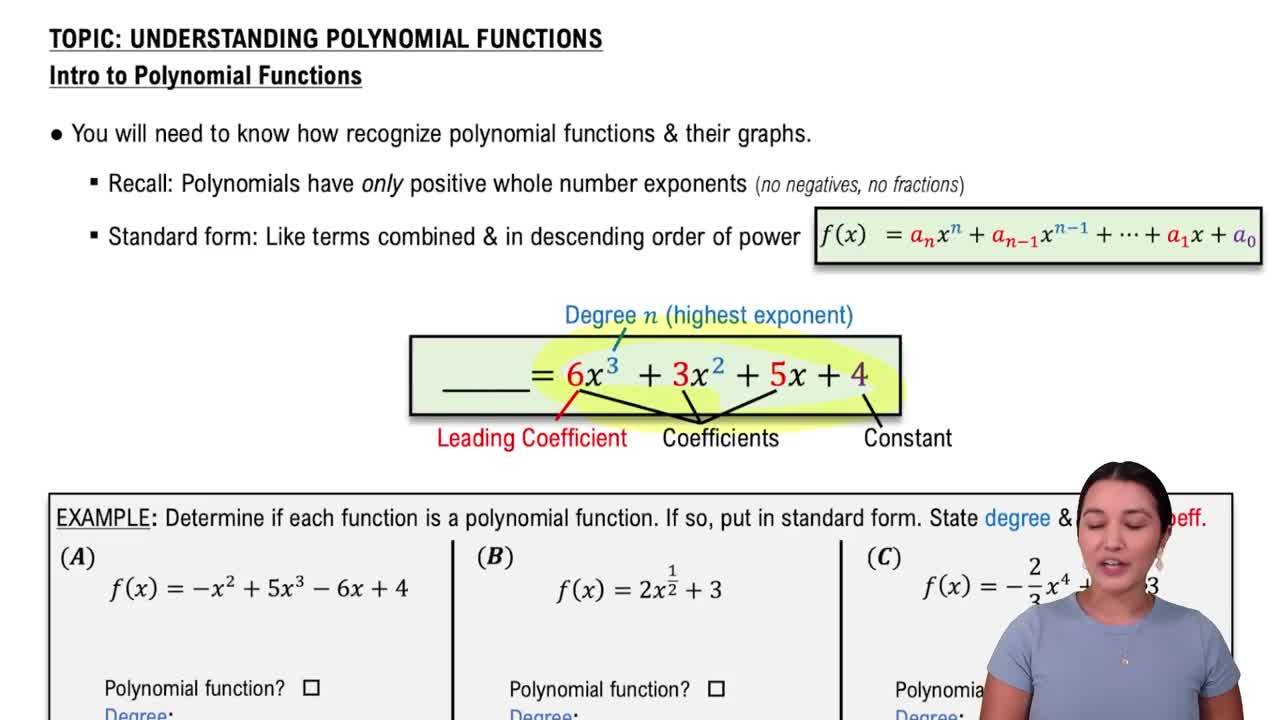Table of contents
- 0. Review of Algebra4h 16m
- 1. Equations & Inequalities3h 18m
- 2. Graphs of Equations43m
- 3. Functions2h 17m
- 4. Polynomial Functions1h 44m
- 5. Rational Functions1h 23m
- 6. Exponential & Logarithmic Functions2h 28m
- 7. Systems of Equations & Matrices4h 6m
- 8. Conic Sections2h 23m
- 9. Sequences, Series, & Induction1h 19m
- 10. Combinatorics & Probability1h 45m
4. Polynomial Functions
Zeros of Polynomial Functions
Problem 108
Textbook Question
Find all complex zeros of each polynomial function. Give exact values. List multiple zeros as necessary.* ƒ(x)=x^4+4x^3+6x^2+4x+1
 Verified step by step guidance
Verified step by step guidance1
insert step 1: Recognize that the polynomial \( f(x) = x^4 + 4x^3 + 6x^2 + 4x + 1 \) is a binomial expansion.
insert step 2: Notice that the polynomial resembles the expansion of \((x+1)^4\).
insert step 3: Verify by expanding \((x+1)^4\) to ensure it matches \( f(x) \).
insert step 4: Since \( f(x) = (x+1)^4 \), the zeros of the polynomial are the solutions to \((x+1)^4 = 0\).
insert step 5: Solve \((x+1)^4 = 0\) to find the complex zeros, considering multiplicity.
Recommended similar problem, with video answer:
 Verified Solution
Verified SolutionThis video solution was recommended by our tutors as helpful for the problem above
Video duration:
7mPlay a video:
Was this helpful?
Key Concepts
Here are the essential concepts you must grasp in order to answer the question correctly.
Complex Zeros
Complex zeros are solutions to polynomial equations that may include imaginary numbers. They occur when the polynomial does not intersect the x-axis at certain points, leading to roots of the form a + bi, where a and b are real numbers. Understanding how to find complex zeros is essential for analyzing polynomial functions, especially when they have even degrees or repeated roots.
Recommended video:

Complex Conjugates
Polynomial Functions
A polynomial function is a mathematical expression involving a sum of powers in one or more variables multiplied by coefficients. The degree of the polynomial, determined by the highest power of the variable, influences the number and type of zeros it can have. For example, a fourth-degree polynomial can have up to four zeros, which may be real or complex.
Recommended video:

Introduction to Polynomial Functions
Factoring and the Fundamental Theorem of Algebra
The Fundamental Theorem of Algebra states that every non-constant polynomial function has at least one complex root, and the total number of roots (counting multiplicities) equals the degree of the polynomial. Factoring polynomials can help identify these roots, as it breaks down the polynomial into simpler components, making it easier to find both real and complex zeros.
Recommended video:
Guided course

Introduction to Algebraic Expressions
Related Videos
Related Practice



